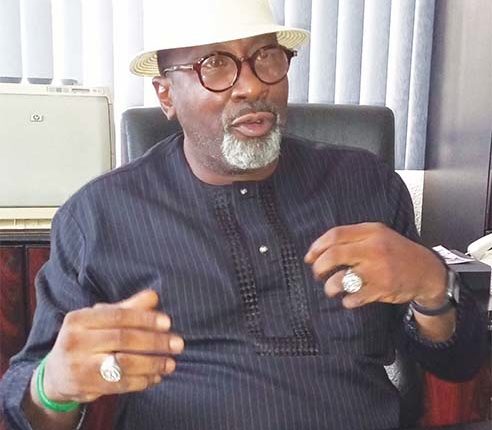The government must go back to cashless system and limit amount that can be collected. – Folashade Coker
The lack of prudent fiscal management in many developing countries, particularly in Nigeria, can largely be attributed to mismanagement born out of corruption. Corruption is a pervasive issue that plagues many aspects of society, and it has had a detrimental impact on the country’s fiscal management. In order to steal from the system, one must mismanage people, time, and resources, and this has been a prevalent issue in Nigeria for many years.
As the renowned musician Sunny Ade once sang, “Nigeria, all hands must be on deck. Top to bottom.” This sentiment rings true in the context of fiscal management, as it is imperative that all levels of government and society work together to address the issue of corruption and its impact on fiscal management. Decades of the same practices have yielded little to no change, and it is clear that a different approach is needed in order to see real progress.
To address the lack of prudent fiscal management, it is crucial to tackle the root causes of corruption and mismanagement. This involves implementing transparent fiscal policies and holding accountable those who engage in corrupt practices. Additionally, there must be a concerted effort to promote ethical behavior and integrity in all aspects of governance. Only then can Nigeria begin to see a different and more positive outcome in its fiscal management.
The idea of the government going back to a cashless system and limiting the amount that can be collected by people daily to 150k is a controversial one, but it is worth exploring. This move has the potential to immediately reduce the rate of kidnapping and money laundering in the country. The power of accurate data cannot be overemphasized, as it can be used and reused for a lot of purposes. As a country, we must invest in gathering accurate data, as it is critical for security, infrastructure, the food chain, and even politics.
One laudable move made by the government was the implementation of the cashless policy by the former Governor of the Central Bank of Nigeria, Godwin Emefiele. This policy aimed to reduce the amount of physical cash circulating in the economy and encourage the use of electronic payment systems. This move was commendable as it would have made it more difficult for criminals to launder money through physical cash transactions.
In addition, limiting the amount that can be collected by individuals daily to 150k would make it harder for criminals to move large amounts of money without detection. This would directly impact the activities of kidnappers and other criminal elements who rely on cash transactions to carry out their illegal activities.
Furthermore, accurate data is essential for various sectors of the economy. For example, the agricultural sector can use accurate data on the number of livestock in different states to inform policies and planning. Inaccurate data can lead to misallocation of resources and hinder development.
The government should seriously consider going back to a cashless system and limit the amount that can be collected by people daily to 150k as a means to reduce kidnapping and money laundering in the country. Additionally, investing in gathering accurate data is crucial for various sectors of the economy and can have a significant impact on security, infrastructure, and the overall development of the country.
The data of fuel usage in a country would have been inaccurate if it only took into consideration the legal production of fuel. Illegal refineries, generators, and the use of petrol or diesel by vehicles would all have a significant impact on the overall consumption of fuel. The lifespan of roads is also affected by the number of vehicles using them. It is a well-known fact that a failure to plan is, in essence, a plan to fail. This is why, in the 1970s, the government introduced measures such as odd and even number restrictions for cars. Unfortunately, history seems to have been forgotten and there is a lack of continuity in these measures.
In contrast, other countries have implemented functional public transportation systems to reduce corruption and level the playing field. This has the added benefit of reducing wear and tear on roads, making the job of security and traffic control easier for officers. A holistic approach is needed to address these interconnected issues, and every minister or commissioner should understand that their actions or inactions have an impact on other sectors. It is a vicious circle – each factor impacts the others, and any serious government must address this interdependence. By tackling these issues collectively, a government can ensure a more sustainable and efficient system.
The type and quality of fuel produced have a significant impact on numerous aspects of society, including the safety of transportation, the stability of power generation, and the overall health and well-being of the population. When the fuel used in engines and planes is of low quality, it can lead to an increased number of engine failures, crashes, and accidents, putting the lives of individuals at risk. Similarly, the inability to generate the required amount of power can have widespread repercussions on manufacturing processes, food supply, and overall security.
When the fuel used in engines and planes is of low quality, it can lead to an increased number of engine failures, crashes, and accidents. When engines are unable to function properly due to poor fuel quality, the risk of an accident increases significantly, putting the lives of passengers and crew members at risk. Furthermore, the use of subpar fuel in planes can result in technical malfunctions that may lead to catastrophic crashes, which can have devastating consequences for both the aviation industry and the individuals involved.
In the automotive industry, the quality of fuel also plays a crucial role in preventing car crashes and accidents. Poor-quality fuel can cause engine knock, which can impair the performance of the vehicle and increase the likelihood of accidents. Additionally, the use of low-grade fuel can lead to engine misfires, loss of power, and potentially dangerous situations on the road. Ensuring that vehicles are powered by high-quality fuel is essential for maintaining the safety and integrity of the transportation industry.
Furthermore, the inability to generate the required Megawatts of power due to low-quality fuel can have far-reaching implications for various sectors of society. Inadequate power generation can disrupt manufacturing processes, leading to delays in production and impacting the overall economy. Additionally, the stability of power generation is crucial for ensuring a steady food supply, as many aspects of food production and distribution rely on electricity. Without a reliable power supply, the security of the food chain can be compromised, leading to shortages and potential food crises.
Moreover, the availability of consistent and reliable power is essential for maintaining overall security and well-being. The presence of light is known to deter criminal activity, as areas with proper lighting are less likely to experience theft, vandalism, and other illicit activities. With a reliable power supply, governments can invest in additional security measures such as CCTV cameras, street lights, and other forms of urban lighting, creating safer communities and deterring criminal behavior.
Additionally, a stable power supply is crucial for boosting the night economy and promoting tourism. With adequate lighting and power, cities and towns can thrive during the evening hours, fostering a vibrant nightlife and encouraging tourism. Foreign direct investors would be more inclined to invest in regions with a dependable power supply, as it signals stability and security for their investments.
Another critical aspect impacted by the quality of fuel is the health sector. Adequate power supply is essential for operating life support systems, medical equipment, and ensuring the safety of patients during surgical procedures. With a stable power supply, hospitals and healthcare facilities can offer improved care and reduce the reliance on backup generators, ultimately saving lives and improving overall health outcomes.
In conclusion, the type and quality of fuel produced have a far-reaching impact on numerous aspects of society, including transportation safety, power generation stability, economic prosperity, and public health. Investment in high-quality fuel production is crucial for promoting safety, security, and overall well-being, ultimately leading to a more sustainable and prosperous future for all.
The relationship between government and religion is a complex and often contentious one. On one hand, the government has a responsibility to provide for the needs of its citizens, including security, infrastructure, and social services. On the other hand, religion plays a significant role in the lives of many individuals, providing them with a sense of community, purpose, and moral guidance.
The intertwining of government and religion can create a vicious cycle in which people turn to their faith for what the government should be providing. This can lead to a loss of patronage for churches and mosques as people feel that their prayers are not being answered. Additionally, it can erode religious tolerance as people become disillusioned and question the effectiveness of their faith.
Furthermore, the actions of public officers can greatly impact the relationship between government and religion. When public officers act in a manner that is corrupt or unethical, it undermines the trust that people have in their government and can lead to a lack of faith in the system as a whole. This, in turn, can lead to a more honest and truly God-fearing society, as people turn to their faith for guidance in the face of government failures.
In order to break this vicious cycle, it is imperative that public officers are held accountable for their actions and are not allowed to act in a manner that undermines the trust and faith of the citizens they serve. By fostering a government that is transparent, ethical, and responsive to the needs of its people, we can create a society in which religious tolerance and honest, God-fearing individuals can thrive.
For most Nigerians to function at its highest capacity, it is imperative that all hands from top to bottom are carefully selected and appointed based on their qualifications and expertise. This is especially crucial when it comes to the leadership of a nation. It is not a time for political favors or familial settlements; it is a time for ensuring that the most competent individuals are placed in positions that are fit for their specific skill sets.
Whether it is at the national or regional level, leaders must engage in open dialogue with their respective zones to ensure that the most qualified individuals are chosen for key positions. Just as a national football team fields its best players to achieve success, so too must a government select the most capable individuals to lead and make critical decisions on behalf of its citizens.
Furthermore, these leaders must understand that they hold their positions in trust for the entire population, and that it is not a personal appointment, but a responsibility to serve the entire nation. Just like in any corporate setting, ministers and commissioners should be given key performance indicators to ensure that they are held accountable for their actions and decisions.
Ultimately, it is essential that those in positions of leadership are well-prepared, highly qualified, and understand the gravity of their responsibilities to effectively serve the people they represent.
In his novel “Things Fall Apart,” Chinua Achebe famously wrote, “Things will fall apart cos the center/core can’t hold.” This profound statement serves as a warning about the dangers of internal disintegration and the unstoppable collapse of a system when its core is weak. Unfortunately, this concept can easily be applied to the state of many countries, where corruption, inequality, and lack of sustainable structures lead to eventual collapse.
The failure to establish a strong core or center in a country will result in destructive consequences, much like cancer destroying from the inside out. Many countries fail to see this impending disaster until it is too late. Without a solid foundation and effective management, essential resources and opportunities will be taken advantage of by a few, further perpetuating inequality and political disarray.
In order to prevent such a catastrophic downfall, it is crucial to implement policies and structures that ensure equal distribution of resources and opportunities. For example, providing every child in schools and capable adults with a piece of land to farm as a civic responsibility can contribute to a sustainable and equitable society. Moreover, implementing realistic oversight and effective benefit systems can drive people to be committed to these initiatives, ultimately strengthening the core of the country and preventing its collapse. It is imperative to address these issues before it is too late and the center can no longer hold.
Once hunger is dealt with, most people are okay. This simple statement holds a great deal of truth, as food is a basic human need that, when fulfilled, can allow individuals to focus on other areas of their lives. However, in many parts of the world, including Nigeria, hunger remains a prevalent issue, particularly in areas such as Ajegunle, Obalende, and Sangotedo. In these areas, the struggle to find a meal to stave off hunger is a daily reality for countless individuals, including children. The effects of hunger can be devastating, leading to a myriad of physical, mental, and emotional health issues. It is a problem that requires immediate attention and action. The statement, “Once hunger is dealt with, most people are okay,” serves as a pressing reminder that addressing this fundamental issue is crucial for the well-being of the nation as a whole.
It is important to recognize that the impact of hunger is not limited to the individuals directly affected by it. The boy in Ajegunle who cannot sleep due to hunger ultimately impacts the rich man in Ikoyi, Banana Island, VI, and Gbagada, as well. When basic needs such as food are not met for a significant portion of the population, it can lead to social unrest, economic instability, and rampant inequality. In the long run, these issues can affect the entire nation, creating a ripple effect that touches the lives of everyone, regardless of their social or economic status.
As a nation and as a leadership, it is crucial to address the issue of hunger in a way that brings about sustainable change. Addressing this issue requires systemic intervention that goes beyond temporary relief efforts. It is essential to provide access to nutritious food, education on farming and agricultural practices, and opportunities for economic empowerment. By investing in these long-term solutions, the nation can begin to address the root causes of hunger and create lasting change for its citizens.
In addition, the statement “It’s a time of WE, not I” is a powerful call to action for individuals, communities, and leadership to come together in solidarity to address the issue of hunger. This sentiment highlights the collective responsibility of all citizens to support and uplift those in need, particularly in times of crisis. By working together, we can pool our resources, talents, and expertise to create impactful change that benefits everyone.
Furthermore, it is important for leadership at all levels to prioritize the issue of hunger and commit to enacting policies and initiatives that address the root causes of food insecurity. This may include investing in infrastructure for food distribution, implementing programs to support small-scale farmers, and creating economic opportunities in marginalized communities. By taking a united approach to tackling hunger, the nation can create a more equitable and prosperous future for all its citizens.
It is also essential for individuals to recognize their own power to make a difference in the fight against hunger. Whether through volunteering, donating to food banks, supporting local farmers, or advocating for policy change, every person has the ability to contribute to the collective effort to alleviate hunger. By coming together as a community, we can create meaningful change that positively impacts the lives of those in need.
In conclusion, the statement “Once hunger is dealt with, most people are okay” serves as a poignant reminder of the fundamental importance of addressing food insecurity in Nigeria. It is a call to action for individuals, communities, and leadership to come together in solidarity to create sustainable change. By prioritizing the well-being of all citizens and working together to address the root causes of hunger, we can create a brighter future for the nation. It is indeed a time for “WE, not I” and by embracing this ethos, we can build a more equitable and prosperous society for all. God bless Nigeria.
Do you have any information or event for TribuneTimes to publish or cover? Kindly Call us on +2349053535322 or send us message on Whatsapp number +2349053535322 or send us an email here





